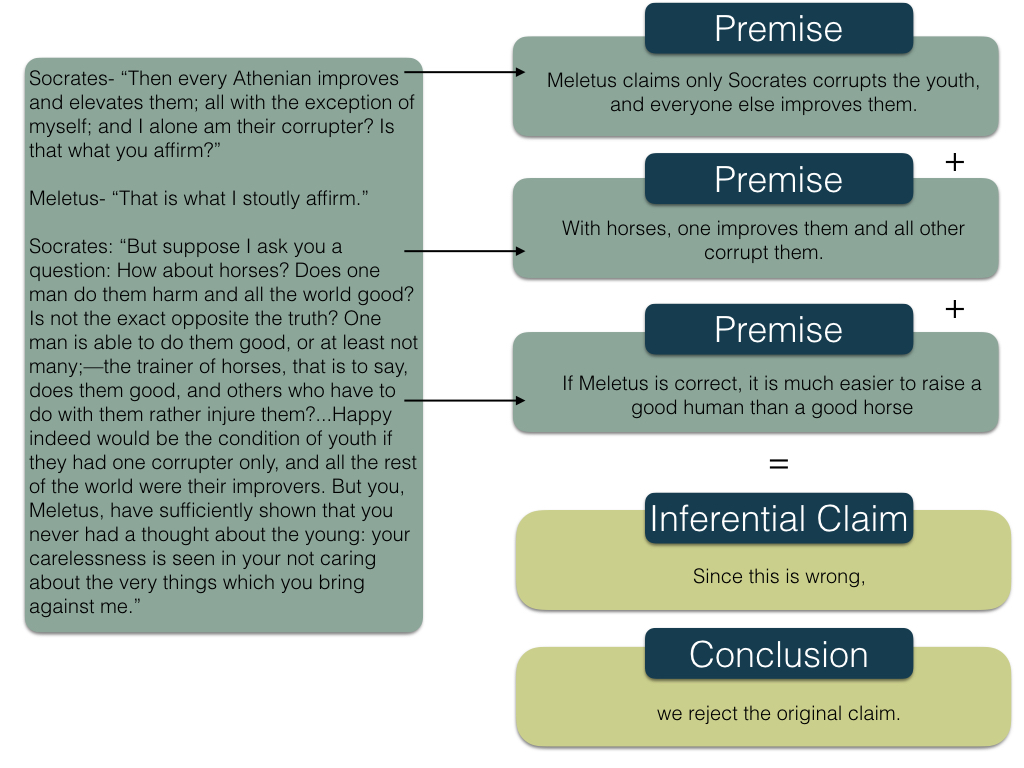Table of Contents |
Recall that the Apology is a transcript (recorded by Plato) of Socrates' trial. In it, Socrates presents his defense. He had been charged with denying the gods and, more seriously, corrupting the youth of Athens.
As Socrates indicates, the real charges against him were unpopularity and making powerful enemies. Since it was his practice of philosophy that led to the charges, he needed to prove that his search for truth, and his attempts to lead others to it, were good and worthwhile occupations. He had to prove that he did not corrupt the youth and to let his accusers know that he did not fear death.
The Apology begins after the prosecution has presented its case. Socrates began his defense by making a distinction between the “old charges” and the “new charges.” By “new charges,” he meant the official charges: denying the gods and corrupting the youth of Athens. The “old charges” were, collectively, his reputation.
In addressing the “new charges,” particularly the charge that he had corrupted the youth of Athens, Socrates (using his dialectic method), argued with the chief prosecutor, Meletus. In their exchange, Socrates makes two arguments: one inductive, one deductive.
Review the following text and see if you can reconstruct Socrates' arguments before evaluating them.
In the first (inductive) argument, Socrates led Meletus to state his claim precisely:
This passage indicates the direction Socrates’ argument would take. Meletus’s assertion was that everyone else improved the youth; only Socrates corrupted them. Socrates next showed that this assertion was bizarre:
Extraction of premises and a conclusion from the preceding text produces the following:

The statement that it is much easier to raise a good human than a good horse is clearly false. As a result, we must reject Meletus’ original assertion.
Socrates' argument is inductive because it is based on cause-and-effect relationships. The conclusion resulting from Meletus' premise is logically sound. Absurd conclusions are improbable; they should not be believed unless overwhelming evidence compels us to do so. No youth (or their parents) accused Socrates. Therefore, there is no evidence to support the absurd conclusion (much less "overwhelming" evidence). We must reject the premise which led to it.
Socrates next made a deductive argument:
Look for Socrates' main point in this passage: Corruption of the youth is either intentional or unintentional. Socrates must show why either of those options leads to a not guilty verdict.
The argument may be reconstructed as follows:

This leads to a not guilty verdict either way. Note that these three premises deductively entail this conclusion and Meletus has granted all three of them. This means that he has also granted the conclusion. Unfortunately for Socrates, the jury did not agree.
The jury was not persuaded by Socrates’ arguments and found him guilty. Meletus asked for a penalty of death; Socrates did not suggest a viable alternative. As a result, he was sentenced to death.
Before and after his sentence was pronounced, Socrates presented the reasons why he did not fear death. Most importantly, he had done what he thought was right: he had pursued wisdom and taught others to do so, and he had lived according to the principles of his moral philosophy.
Socrates stated, “The difficulty, my friends, is not to avoid death, but to avoid unrighteousness; for that runs faster than death.” He indicated that good people do what they know is right, regardless of negative personal consequences. Even the risk of execution should not influence what good people ought to do.
Socrates maintained that all people are obligated to perform the “godly” pursuit of philosophy, of seeking wisdom and practicing right living. These activities are peculiar to humans. Without them, we fall short of our humanity. As Socrates famously stated, “the unexamined life is not worth living.”
As a final statement indicating his determination to do what he knows is right, Socrates made another deductive, either-or argument about why we should not fear death.
Like his deductive argument as to why he did not corrupt the youth, this argument is presented in an either-or format.
The argument can be reconstructed as follows:

In maintaining the third premise, Socrates ignored the possibility of a negative afterlife (e.g., hell). However, concepts of eternal damnation were not hypothesized until centuries later. Additionally (and more importantly), Socrates described an afterworld ruled by true judges, who would not fault or punish him for dedicating his life to pursuing wisdom and moral philosophy. If we believed Socrates when he told us that we should pursue wisdom, this third premise is appropriate.
Source: This tutorial was authored by Sophia Learning. Please see our Terms of Use.